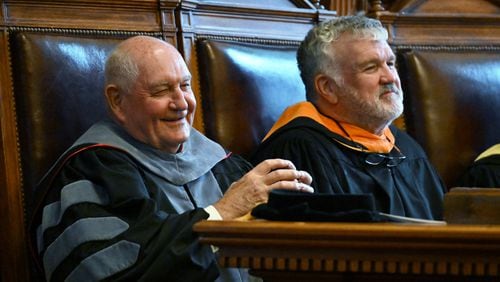EASTMAN, Ga — Dodge County Hospital is surviving — at least for now.
Seven years ago the small hospital in Eastman teetered on the brink. It had zero cash in the bank. Suppliers were demanding cash on delivery or no supplies. The entire staff had already taken a 10 percent pay cut. The chief financial officer and head of nursing were searching for new jobs.
“It doesn’t get a whole lot worse than that,” Sandra Campbell, the hospital’s chief nursing officer, said recently. “It was really bad.”
A new CEO took the reins in 2007, slashing dozens of jobs and renegotiating contracts with doctors and suppliers. But the hospital still needed a one-time infusion of $160,000 from its local county government to keep the doors open and will ultimately be forced to ask for even more taxpayer dollars to survive long-term. It’s a decision, experts say, county and city leaders across rural Georgia will increasingly be forced to make: pony up hundreds of thousands of dollars to bolster hospitals’ bottom lines or stand by and let a critical piece of their communities slowly die.
Statewide, dozens of rural hospitals are struggling to survive in the face of declining populations, fewer paying patients and decreasing payments from the government and private insurers. Eight have closed since 2001. Nearly two-thirds of the remaining 61 hospitals have experienced significant losses in the past five years, state data shows.
Dodge County Hospital is a rare success story — one of only seven rural hospitals to consistently make a profit in recent years. But that success may be short-lived.
“We’ve had to make tough decisions,” CEO Kevin Bierschenk said. “We’re running it as a business, but, unfortunately, with everything that’s happened in health care, it’s getting tough.”
More than 80 percent of the hospital’s patients don’t have insurance or have government insurance, Medicare or Medicaid, that doesn’t pay enough to cover the actual cost of care, Bierschenk said. That just doesn’t work financially, he said.
“If we don’t fix the problem, we’re going to be struggling like everybody else,” he said. “We’re going to have to fund it if the county wants it to stay open. The community’s got to want it.”
‘I would have been dead, absolutely’
Helen Peterson wouldn’t be alive without Dodge County Hospital.
At 79, Peterson has lived in Eastman all of her life along with most of her family. She helps her cousin run the local bed and breakfast inn and is on a first name basis with many of the doctors and nurses at the hospital, including those who saved her life.
Shortly after Mother’s Day in 2012, Peterson found herself feeling dizzy and a little short of breath. She called her son who rushed her to the ER.
“(The doctor) came in and said, ‘Miss Helen, what’s wrong with you?’” Peterson recalled, sitting with her cousin at the inn on a sunny afternoon. “I said, ‘I have no earthly idea. What do you think I’m doing here?’”
They shocked Peterson twice to reset her heart’s rhythm and transported her to a hospital in Macon where she had triple bypass surgery. Peterson said she understands the importance of supporting her local hospital; she knows people would probably die by the time an ambulance could get them to another facility.
“If we didn’t have the hospital, I would have been dead, absolutely,” she said.
The Eastman hospital already gets patients who once would have gone to nearby Telfair Regional Hospital, which closed in 2008.
When Campbell, the chief nurse, sees a Telfair County ambulance, she thinks about the fact that the patient has already been on the road at least 20 minutes before even getting to an ER.
“They don’t really have much of a chance,” she said. “When a hospital closes, a community starts to die.”
Counties step up to fill the gap
In early 2014, Gov. Nathan Deal appointed a group of hospital executives, state lawmakers, county leaders and industry experts to find solutions to the rural health care crisis.
But those solutions likely remain a long ways off given the complexity of the problem. Meanwhile, communities must decide whether to step up and help themselves. Some counties have the means to do just that; many do not.
This past summer, Habersham County agreed to take on roughly $38 million in monthly bond payments for the hospital in Demorest, Habersham Medical Center. It also took ownership of the hospital building itself. Elbert County commissioners voted last year to increase the property tax to help sustain Elbert Memorial Hospital in Elberton.
Candler and Evans counties have also supported their hospitals financially, said Dave Wills with the Association County Commissioners of Georgia. It’s a challenging decision more rural counties will face as their hospitals’ finances deteriorate, experts say.
County leaders have to look at not just whether it will get any money it invests in a hospital back directly but also the larger benefits a hospital provides a community, such as encouraging economic development, Wills said. They also have to be cautious to make those decisions based on facts not emotional appeals from hospital officials and employees, he said.
Wills added that counties have to look at supporting a hospital for an extended period of time, not just one or two years like in the past. “I see nothing to indicate the situation is going to improve in the near term.”
‘Everyone’s life has been impacted’
The fate of Dodge County Hospital lay in the hands of the local county leaders seven years ago.
The Dodge County commission held three public hearings at the time to discuss whether to increase the millage rate to help fund the cash-strapped facility for one year. They met in a superior court room instead of the usual commission chambers in order to fit the large crowd.
“It was an amazing thing,” recalled Dan McCranie, who chairs the board. “Everybody that got up and said something had positive things to say about the hospital.”
They had watched as other area hospitals closed and were all in favor of doing whatever it took to help their own hospital survive, McCranie said. And he’s confident the community will step up and help the hospital financially again if it comes to that.
“Everyone’s life has been impacted by the hospital at one time or another,” he said. “People have ownership. It’s their hospital.”
About the Author





